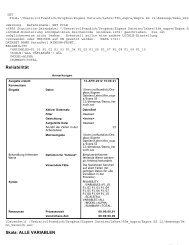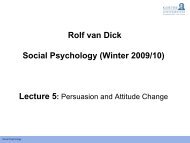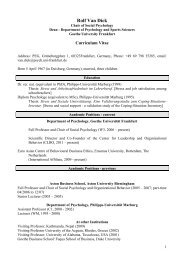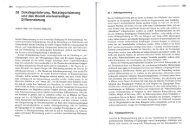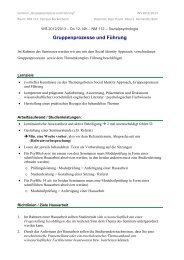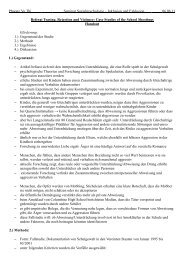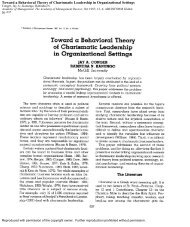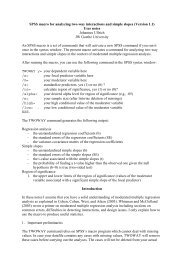Leadership-Interview-Transkript - Sozialpsychologie - Goethe ...
Leadership-Interview-Transkript - Sozialpsychologie - Goethe ...
Leadership-Interview-Transkript - Sozialpsychologie - Goethe ...
Sie wollen auch ein ePaper? Erhöhen Sie die Reichweite Ihrer Titel.
YUMPU macht aus Druck-PDFs automatisch weboptimierte ePaper, die Google liebt.
positive safety climates. And that, in fact, relates to the extent to which they have accidents.<br />
The other…<br />
Rolf van Dick: Did you study soldiers that went to Afghanistan or elsewhere?<br />
Frederick Morgeson: We studied a transportation unit and it was basically the people that<br />
moved all the heavy equipment around. If you would need a tank in Iraq, those people would<br />
bring you a tank to Iraq. And we found that if you have a positive relationship with your<br />
leader and if he created a positive safety climate you’d had the crucial greatest amount of<br />
citizenship behavior around safety and effectiveness.<br />
Rolf van Dick: Ok…<br />
Frederick Morgeson: But I think, the other piece that I’ve experienced more as a professor<br />
of a Business School, is the extent to which a leader can move an organization forward or not.<br />
And, sort of most my experiences are that most leaders are sort of status quo. And so you just<br />
sort of move sideways, you never go up and you never go down, it’s very much lack of<br />
innovation. And, I think, good leaders have a vision, good leaders move organizations<br />
forward and that’s a component which I think is really important.<br />
Rolf van Dick: That almost answers my next question, how you would characterize effective<br />
leadership. Would you say that what you just mentioned - moving the organization forward -<br />
is the most important distinction between a leader and a manager?<br />
Frederick Morgeson: Well, certainly the ‘vision’ part of leadership is a distinguishing<br />
feature, but from my standpoint it doesn’t make a big distinction between leadership and<br />
management. For me, an effective leader does a number of things, and I focus more onto the<br />
behavioral components as opposed to the attributes of a leader, although I think there’s one<br />
key attribute which I’ll mention at the end. The first thing is that they are really sensitive to<br />
their followers’ needs. So, to the extent that a leader understands what the followers need<br />
from them and then provides that, and the trick as a leader is, that everyone who follows you<br />
is different. Trying to understand what those unique needs are of those people is I think a key<br />
leadership role. For people that are professionals, they’re often quite autonomous and able to<br />
work on their own, so for me, the leadership role is a little different. One is a sort of a<br />
resource – to what extent can I as a leader get resources that help my followers being<br />
successful. Another key role is to manage the boundary between the leader and the broad<br />
organization, that is preventing things from affecting your followers or coordination across<br />
units or across people. Another thing that I think is super-important is the idea of opportunityproviders,<br />
so they’re out there scanning the environment looking for opportunities for their<br />
followers and the best leaders really figure out ways that are consistent with what followers<br />
want to accomplish in their professional life and giving them those opportunities. And<br />
probably the characteristics that I would think of is trustworthiness, that you really do what<br />
you say. That’s really important because trust is a foundation for high-quality relationships.<br />
Rolf van Dick: Ok, so you think a leader needs many of those things and the best leaders<br />
have all of them, do you think that people can learn that? Are leaders born, or made?<br />
Frederick Morgeson: Well, the easy answer is yes, they’re born and they’re made. Research<br />
is suggestive that about 30% of leadership is sort of a genetic component, a born component.<br />
So, 70% is made or developable. And, I mean if you think about what leadership is – it’s<br />
influence, it’s engaging in certain kinds of behaviors – those are things that you can learn. I




